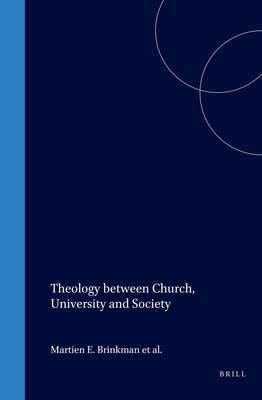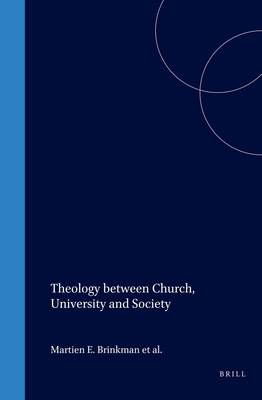
- Afhalen na 1 uur in een winkel met voorraad
- Gratis thuislevering in België vanaf € 30
- Ruim aanbod met 7 miljoen producten
- Afhalen na 1 uur in een winkel met voorraad
- Gratis thuislevering in België vanaf € 30
- Ruim aanbod met 7 miljoen producten
Zoeken
Theology Between Church, University, and Society
€ 152,95
+ 305 punten
Omschrijving
STAR - Studies in Theology and Religion 6
Theology between Church, University, and Society includes contributions to the international NOSTER conference "Theology between Church, University and Society," held in the Netherlands in June 2000.
In the current academic world theologians are often suspected of confessionalism, bias and narrow-mindedness. They in turn try to regain respect by producing specialist historical, empirical and analytical studies that are in line with other academic research.
This retreat into neutrality renders them suspect in the eyes of their religious communities. Some churches react by reformulating their appointment policies, and become more strict in order to secure the full loyalty of the theological staff of their institutions. Therefore, many theologians feel a conflict between loyalty to their tradition and loyalty to the academic world.
Student populations have also changed considerably during the last few decades. Quite a number of students have a lively interest in religion but no religious affiliation at all. University teachers have to adapt to these new audiences and faculties need to reorient themselves to reestablish their goals.
This volume is concerned with these three challenges: academic, religious and societal. In all of the contributions the tension between descriptive research and normative theses or the relation between theology and society at large is discussed. Not only are there descriptions of the structures of theological institutions in the Netherlands, the USA, and South Africa but also of the relations between churches and theological institutions, and Vatican policy regarding theological faculties.
Theology between Church, University, and Society includes contributions to the international NOSTER conference "Theology between Church, University and Society," held in the Netherlands in June 2000.
In the current academic world theologians are often suspected of confessionalism, bias and narrow-mindedness. They in turn try to regain respect by producing specialist historical, empirical and analytical studies that are in line with other academic research.
This retreat into neutrality renders them suspect in the eyes of their religious communities. Some churches react by reformulating their appointment policies, and become more strict in order to secure the full loyalty of the theological staff of their institutions. Therefore, many theologians feel a conflict between loyalty to their tradition and loyalty to the academic world.
Student populations have also changed considerably during the last few decades. Quite a number of students have a lively interest in religion but no religious affiliation at all. University teachers have to adapt to these new audiences and faculties need to reorient themselves to reestablish their goals.
This volume is concerned with these three challenges: academic, religious and societal. In all of the contributions the tension between descriptive research and normative theses or the relation between theology and society at large is discussed. Not only are there descriptions of the structures of theological institutions in the Netherlands, the USA, and South Africa but also of the relations between churches and theological institutions, and Vatican policy regarding theological faculties.
Specificaties
Betrokkenen
- Uitgeverij:
Inhoud
- Aantal bladzijden:
- 249
- Taal:
- Engels
- Reeks:
- Reeksnummer:
- nr. 6
Eigenschappen
- Productcode (EAN):
- 9789023239178
- Verschijningsdatum:
- 1/01/2003
- Uitvoering:
- Hardcover
- Formaat:
- Genaaid
- Afmetingen:
- 163 mm x 241 mm
- Gewicht:
- 589 g

Alleen bij Standaard Boekhandel
+ 305 punten op je klantenkaart van Standaard Boekhandel
Beoordelingen
We publiceren alleen reviews die voldoen aan de voorwaarden voor reviews. Bekijk onze voorwaarden voor reviews.







